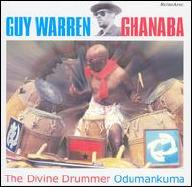In the mid-'50s, based in Chicago, Warren began leading a string of different combos of varying sizes, all directed to the fusion of West African music and American jazz. His music -- between 10 and 20 years ahead of his own time in his goals and results -- was unusual enough to attract little more than a cult following, but he did cut albums, including Africa Speaks: America Answers and Theme for African Drums. Other musicians were quick to appreciate Warren's virtuosity and unique gifts, and he was soon traveling in a circle that included Charlie Parker, Thelonious Monk, and Max Roach.
In 1962, he published an autobiography. That same year, he also saw one of his pieces become an international hit -- and a staple for easy listening radio -- when German bandleader Bert Kaempfert recorded That Happy Feeling; drawn from a Warren-authored Ghanian piece, the Kaempfert single and accompanying album helped put African flutes into the Top 40 in America and elsewhere. In 1965, Warren returned to Ghana, where, thanks to his decade in the United States, he was something of a celebrity -- he was also too advanced and too internationally oriented to earn much of a living as a performer, apart from the occasional concert in Accra. By the end of the decade, he'd changed his name to Kofi Ghanaba (i.e., "Son of Ghana"), accepting and even inviting the mantle of being a cultural institution. By rights, he should have been at least as renowned before the public as Ginger Baker -- an Englishman who got to a somewhat similar place in music by following jazz back to Africa -- but he never had the press or the association with an English power trio to carry his name to the world's public. He did participate in the Afro-American music "Soul to Soul" concerts in Ghana that spawned the movie of that name, but principally, Warren has been a teacher since the early '70s. In that role, his years in the United States, coupled with his decades in Ghanian music before and after, have made him a magnet for aspiring percussionists and a living legend among musicians on several continents. Alas, his '50s and early-'60s work remains out of print, though in recent years his later recordings have been re-released on CD, to the delight of drum enthusiasts and jazz (and African music) scholars everywhere ~ Bruce Eder, Rovi












